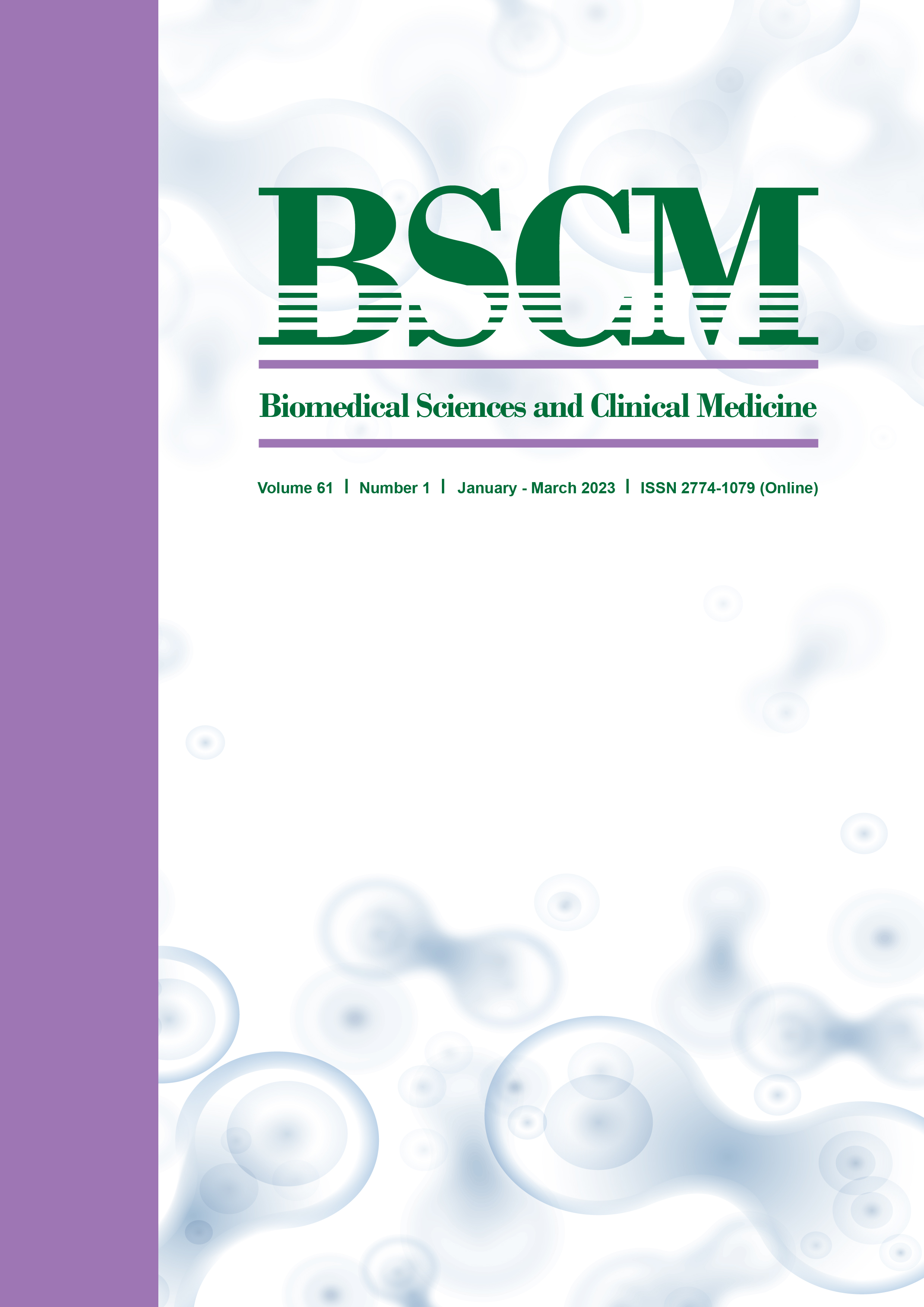Team Psychological Safety and Voice of Nurses in Affiliated Hospitals of Guangxi University of Chinese Medicine, the People’s Republic of China
Keywords:
Team Psychological Safety, Voice, Chinese NursesAbstract
Objectives: To explore team psychological safety and voice of Chinese nurses and examine the relationship between team psychological safety and the voice of nurses in China.
Methods: A descriptive correlational study was conducted among 422 nurses who have worked at least one year in three affiliated hospitals of Guangxi University of Chinese Medicine, the People’s Republic of China. Data collection using a set of questionnaires consist of Demographic Data Form, Team Psychological Safety Climate Scale (TPSCS), and Employee Voice Scale (EVS). Descriptive statistics and Spearman’s Rank-order Correlation were used to analyze data.
Results: Nurses perceived both team psychological safety and voice at a moderate level. Team psychological safety and voice had a strong positive correlation. The dimensions of speak one’s mind freely, respect each other, interpersonal risk-taking, and mutual trust were also found to be significantly and positively associated with voice
Conclusion: When nurses feel psychologically safe in their team, they are more likely to express ideas, information, and opinions which making cooperative contributions to the work unit or the hospital. These findings can guide hospitals and nursing administrators to develop strategies to improve team psychological safety which will lead to an increase in the voice of nurses.
References
2.Weiss M, Kolbe M, Grote G, Spahn DR, Grande B. Why didn’t you say something? Effects of after-event reviews on voice behaviour and hierarchy beliefs in multi-professional action teams. Eur J Work Organ Psychol. 2017 Jan 2;26(1):66-80.
3.Okuyama A, Wagner C, Bijnen B. Speaking up for patient safety by hospital-based health care professionals: A literature review. BMC Health Serv Res. 2014 Dec;14(1):1-8.
4.Noort MC, Reader TW, Gillespie A. Speaking up to prevent harm: A systematic review of the safety voice literature. Saf Sci, 2019 Aug;117:375-87.
5.Holland PJ, Allen BC, Cooper BK. Reducing burnout in Australian nurses: The role of employee direct voice and managerial responsiveness. Int J Hum Resour Manag. 2013 Sep 1;24(16):3146-62.
6.Van Dyne L, LePine JA. Helping and voice extra-role behaviors: Evidence of construct and predictive validity. Acad Manag J. 1998 Feb 1;41(1):108-19.
7.Liang J, Farh CI, Farh JL. Psychological antecedents of promotive and prohibitive voice: A two-wave examination. Acad Manag J. 2012 Feb;55(1):71-92.
8.Mannion R, Davies HT. Cultures of silence and cultures of voice: the role of whistleblowing in healthcare organisations. Int J Health Policy Manag. 2015 Aug;4(8):503.
9.Wang YP, Zu XJ. [Influence of voice behavior and core self-evaluation on career growth among emergency nurses]. J Nurs Sci. 2018 Jul;33(14):63-7.Chinese.
10.Yi KG, Ding SQ, Liu ZN, Xie JF, Qin CX, Zheng F, et al. [Study of the correlationship between nurses’ voice behavior and proactive personality]. Nurs J Chin PLA. 2016 Jul;33(13):1-6. Chinese.
11.Zhao SL, Yang QF, Yang Q. [Influence of organizational climate on the voice behavior of nursing staff in operating room]. Hosp Manag Forum.2018 Apr;35(4):70-73. Chinese.
12.Erkutlu H, Chafra J. Leader’s integrity and employee silence in healthcare organizations. Leadersh Health Serv (Bradf Engl). 2019 Jun 28;32(3):419-34.
13.Alingh CW, van Wijngaarden JD, van de Voorde K, Paauwe J, Huijsman R. Speaking up about patient safety concerns: The influence of safety management approaches and climate on nurses’ willingness to speak up. BMJ Qual Saf. 2019 Jan 1;28(1):39-48.
14.Edmondson AC. Psychological safety and learning behavior in work teams. Adm Sci Q. 1999 Jun;44(2):350-83.
15.Wu ZP, Chen FT. [The scale development of team psychological safety climate in the Chinese cultural context]. Chin J Manag. 2011 Jan;8(1):73-80. Chinese.
16.Pfeifer LE, Vessey JA. Psychological safety on the healthcare team. Nurs Manage. 2019 Aug 1;50(8):32-8.
17.Yan MQ, Kang L. [Relationship between team psychological safety climate and occupational coping self-efficacy among clinical nurses]. J Nurs Sci, 2017 Nov;33(22):59-61. Chinese.
18.Yuan XL, Zhang HZ, Zhou MF. [Correlation study on team psychological safety and resilience of medical staff]. Hosp Manag Forum. 2017 Jun;34(6):63-6. Chinese.
19.Zou ZZ, Chen S. [Effect of team psychological safety on perceptions of benefits of nurses from operating room]. Hosp Manag Forum. 2016 Nov;33(11):53-6. Chinese.
20.Nembhard IM, Edmondson AC. Making it safe: The effects of leader inclusiveness and professional status on psychological safety and improvement efforts in health care teams. J Organ Behav. 2006 Nov;27(7):941-66.
21.Shi YL, Li JP. Research progress of hierarchical division in nursing ladder management in China. Chin Nurs Res. 2016 Sep;3(3):109-12.
22.O’Donovan R, McAuliffe E. A systematic review exploring the content and outcomes of interventions to improve psychological safety, speaking up and voice behaviour. BMC Health Serv Res. 2020 Feb 10;20(1):101.
23.O’Leary DF. Exploring the importance of team psychological safety in the development of two interprofessional teams. J Interprof Care. 2016 Jan;30(1):29-34.
24.Aranzamendez G, James D, Toms R. Finding antecedents of psychological safety: A step toward quality improvement. Nurs Forum (Auckl). 2015 Jul;50(3):171-8.
25.Duan JY, Zhang C, Xu Y. [A meta-analysis of the relationship between demographic characteristics and employee voice behavior]. Adv Psychol Sci. 2016 Oct 15;24(10):1568-82. Chinese.
26.Xu M, Qin X, Dust SB, DiRenzo MS. Supervisor-subordinate proactive personality congruence and psychological safety: A signaling theory approach to employee voice behavior. Leadersh Q. 2019 Aug;30(4):440-53.
27.Liu W, Zhu R, Yang Y. I warn you because I like you: Voice behavior, employee identifications, and transformational leadership. Leadersh Q. 2010 Feb;21(1):189-202.
28.Leung K, Deng H, Wang J, Zhou F. Beyond risk-taking: Effects of psychological safety on cooperative goal interdependence and prosocial behavior. Group Organ Manag. 2015 Feb; 40(1):88-115.
29.Li E, Shen J, Yuan WW. [Correlation between voice behavior and nursing practice environment among nurses]. Chin J Mod Nurs. 2018 Dec;24(36):4397-401. Chinese.
30.Bienefeld N, Grote G. Speaking up in ad hoc multiteam systems: Individual-level effects of psychological safety, status, and leadership within and across teams. Eur J Work Organ Psychol. 2014 Nov 2;23(6):930-45.
31.Miao R, Lu L, Cao Y, Du Q. The high-performance work system, employee voice, and innovative behavior: The moderating role of psychological safety. Int J Environ Res Public Health. 2020 Feb 12;17(4):1150.
32.Cave D, Pearson H, Whitehead P, Rahim‐Jamal S. CENTRE: creating psychological safety in groups. Clin Teach. 2016 Dec;13(6):427-31.
33.Campbell AR, Layne D, Scott E, Wei H. Interventions to promote teamwork, delegation and communication among registered nurses and nursing assistants: An integrative review. J Nurs Manag. 2020 Oct;28(7):1465-72.











